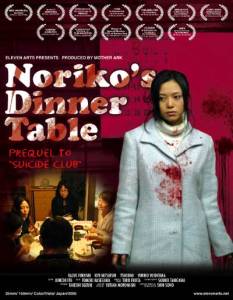Noriko’s Dinner Table
Posted by Holly
Noriko’s Dinner Table
Released: 2006
Director: Sion Sono
Much has been said about Sion Sono’s masterful film Suicide Club and its biting social commentary on Japanese society. Less, however, has been said of its quiet follow-up film, Noriko’s Dinner Table. This is a shame – while it lacks the violent and shocking nature of the first film, its social critique may be perhaps even more severe and jarring than that of Suicide Club.
The story follows Noriko, an average girl who feels bored with her small town life, and craves the adventure and excitement of the city. She dreams of moving to Tokyo after finishing high school, but her father is strictly against this, alienating Noriko further and pushing her towards the company she finds on a mysterious website. Having found companionship with a girl who goes only by Ueno Station 54, Noriko decides to run away from home to join her. However, when she reaches her destination, her friend is not what she seems, and Noriko is brought into a world she did not expect.
What Noriko ends up finding is that her new friend – going by Kumiko in person – heads an organization of actors, dedicated to renting their time out as family members to paying clients. While this seems innocent enough at first, Noriko eventually begins to see that being part of this organization requires giving up all sense of herself and her former life. Meanwhile, the family she left behind begins to tear itself apart in the wake of her disappearance.
This film is not a sequel to Suicide Club; it functions as its own parallel story, with elements that expand upon the mythos set up in the first film. There is certainly overlap between them – the two main characters witness the mass train suicide as a passing event in their own timeline, though it has no direct effect on their story. The direct references allow for the viewer to fully take in how expansive this organization seems to be. In this film, the events of Suicide Club appear to be little more than a drop in the bucket of a much larger and more ominous story.
Personally, I found the organization in this film to be far more disturbing than the concept of a suicide club. There is the tragic element at the heart of their business – they rent their time to people who are so lonely, or caught in grief, that they cannot function without the artificial love provided by it. And while sad at first, this begins to become more unsettling as the film progresses, reaching a painful pinnacle that is hard to look away from. Even ignoring this aspect of it, we are forced to consider how far the people in this organization are willing to go for their clients; the story about the man who wishes to rent a woman to play his cheating wife, so that he can kill her, resolves this question with disturbing clarity.
Kumiko herself is a fascinating riddle of a character. Her actions read as malicious throughout most of the film, and it’s easy to interpret her as the antagonist in the story of the two sisters and their father’s desperate attempt to reunite his family. As the story’s third act unfolds, however, it seems as though there is a lot more to Kumiko than the audience is permitted to see, and her actions become harder to read. Her internal musings on the roles people have in life are quite telling – everyone wants to think they’re a lion (powerful and in control), but there need to be rabbits (passive, victims to feed the lions). She’s unflinchingly willing to accept a role as a rabbit if it’s asked of her, contradicting a lot of what the audience is previously led to believe about her.
At its core, this film is about many things: family, identity, and the bonds we forge with other human beings. It raises a number of questions about the roles we play in society, and while it does not really seek to answer those questions, sometimes simply asking is the scariest thing you can do. Are you a lion or are you a rabbit? And when it comes down to it, do you really have a choice in the matter?
Rating: 4.5 out of 5. Highly recommended!
Scariness level: There aren’t a lot of traditional scares, but I do think this is one of the most chilling movies I’ve ever watched.
Violence level: Low compared to its predecessor, but there’s still some. Several stabbings are shown on screen.
Bechdel test: Noriko and Kumiko comprise the main interactions in the film, Yuka and Noriko coming in second. So this passes by a wide margin.
Mako Mori test: Pass. So much of the plot revolves around the women seeking their own identities.
Posted on April 15, 2015, in Films and tagged 4.5 rating, film, japanese, noriko's dinner table, pass, sion sono. Bookmark the permalink. Leave a comment.
Leave a comment
Comments 0